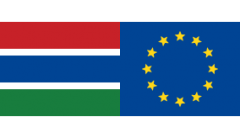Multi-Annual Indicative Programme
The overall lines of the EU international cooperation in the partner country
Basis for programming.
In recent years and since The Gambia voted for democratic change in December 2016, the European Union and its Member States have invested to an unprecedented extent in the country’s democratic transition.
To help propel the process forward, this engagement will be maintained, nurtured and strategically targeted in the period 2021-2027. This entails supporting the country’s efforts to reconcile and rebuild the nation and adopt a new Constitution, accompanying the transition to a security sector that fits democracy, bolstering democratic institutions, strengthening capacities at different levels of the administration, and ultimately helping to create a governance architecture that will facilitate and nurture the country’s socio-economic development.
The basis for programming is a joint framework document between the EU and its Member States which recognises that the geopolitical priorities of the EU are relevant and aligned with the challenges faced by The Gambia, namely:
-
- Democratic state-building, enhancing rule of law and promotion of EU values, nurturing peace and security.
- Promoting a Green Gambia – the sustainable management of the environment and the country’s natural resources: this is indispensable to The Gambia, whose economy relies largely on agriculture and tourism, which are both affected by environmental degradation, loss of biodiversity and climate change. It has at the same time the potential to create numbers of “green jobs”.
- Africa-EU alliance for sustainable growth and job creation: this is much needed in a country where un- or underemployment is prevalent and is one of the causes for migration. Preserving and valorising the environment and biodiversity and better managing natural resources will be key for achieving this, along with social protection.
- Building a migration partnership: the MIP 2021-2027 will strengthen EU-Gambia relations in the area of migration around the axes of the EU’s “New Pact on Migration and Asylum”1.
- Digital transformation: this is identified by both the EU and The Gambia (in its National Development Plan) as a key enabler for governance, job creation and development overall.
In alignment with EU priorities, specific attention will be paid to Human Development (HD). Indeed, the Human Capital Index (HCI) of The Gambia is progressing (from 0,37 in 2010 to 0,42 in 2020) and is slightly above the average of Sub-Saharan Africa. However, it remains that a child born in The Gambia today will be 42 percentages as equipped when (s)he grows up as (s)he could be if (s)he enjoyed complete education and full health. (Read more)
